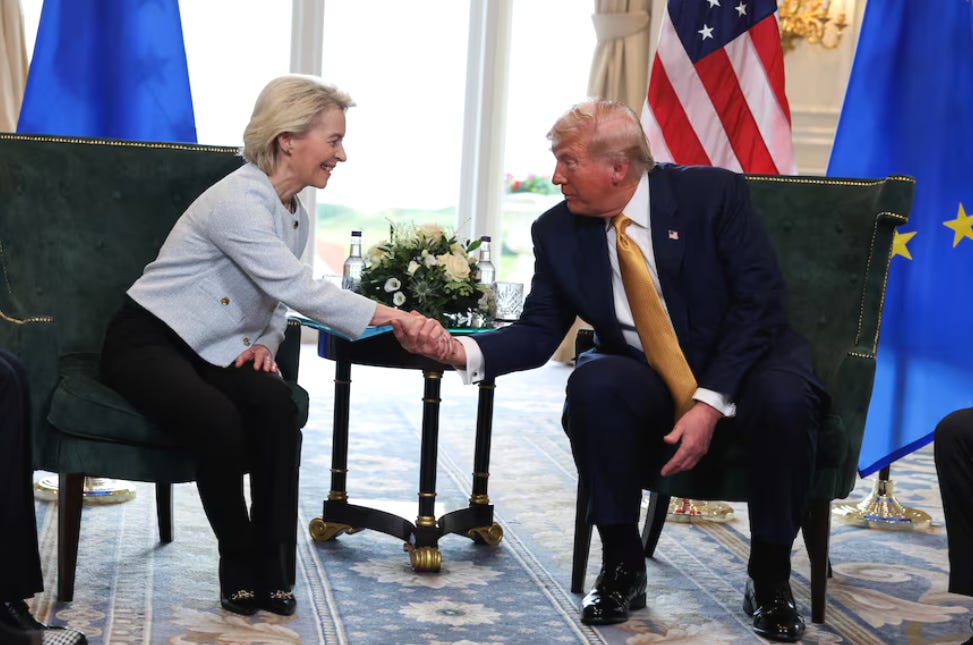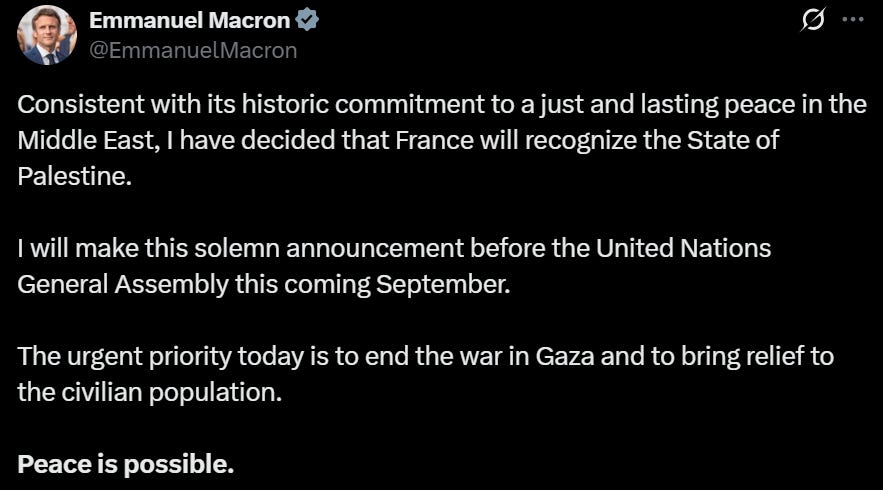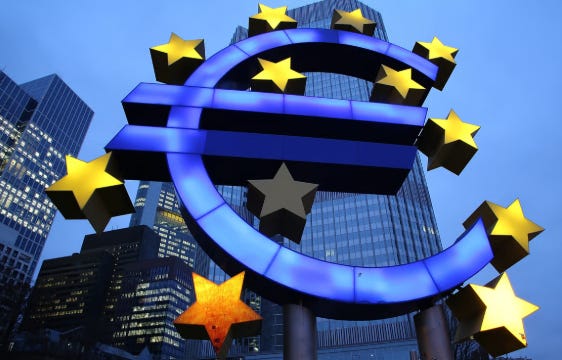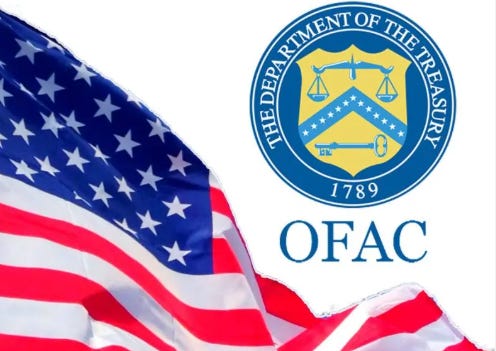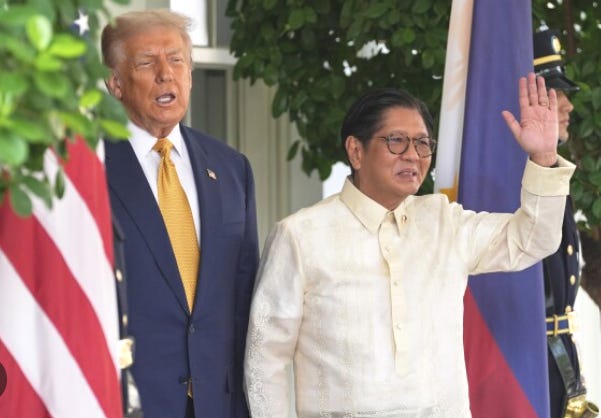France to Recognize the State of Palestine, Eurozone Business Activity Hits Peak, US- EU Finalize Trade Pact, EU-China Agree on Critical Minerals, Thai-Cambodian Conflict Reaches Resolution, and More
Grinfi Political Risk Intelligence Briefing
Welcome to this week’s edition of Grinfi Political Risk Edge, your trusted source for expert political risk analysis and strategic intelligence. In this issue, we examine key geopolitical events shaping the defense, energy, and DeFi markets, providing a deep, beyond-the-headlines assessment. Anticipate, Adapt, and Excel!
But first, Grinfi Consulting has released the inaugural edition of Grinfi Geostrategic Pressure Points, a monthly political risk report distilling key insights from the most critical issues we tracked throughout the month. The June edition is now available. Check it out!
Now, let’s begin the week with a laugh 😄 to brighten the mood.
Help us serve you better and improve Grinfi Political Risk Edge by taking this brief, fully anonymized reader survey.
"Wherever law ends, tyranny begins."
John Locke, Two Treatises of Government, ed. C.B. Macpherson (Indianapolis: Hackett Publishing Company, 1980), Second Treatise, ch. 18, sec. 202.
Disclaimer: The opinion expressed in this quote does not represent our views but is intended for reflection purposes only.
From Grinfi Political Risk Observatory (GPRO), here’s what we’re monitoring:
High Impact Situational Updates
MAJOR HEADLINES
— France Announces Plans to Officially Recognize the State of Palestine
On July 24, French President Emmanuel Macron announced that France will formally recognize the State of Palestine at the upcoming United Nations General Assembly in September. This would make France the first G7 nation to endorse Palestinian statehood in a formal UN setting.
President Macron made the announcement via his official X account:
He also shared a letter addressed to the current President of the Palestinian Authority, Mahmoud Abbas, outlining the French government’s new position.
In the communication, Macron cited worsening humanitarian conditions in Gaza, the failure of peace negotiations, and the urgent need to uphold the principle of a two-state solution. His decision follows the reported deaths of over 59,000 Palestinians since the war began in October 2023, according to data from Gaza’s health authorities.
France’s move builds on momentum from Spain, Slovenia, Ireland, and Norway, which extended recognition and strong diplomatic support for Palestine in 2024. It marks a potential pivot in Western diplomatic strategy toward Israel.
However, the decision has triggered a fierce backlash. Israeli Prime Minister Benjamin Netanyahu denounced it as a ‘reward for terrorism’, while U.S. Secretary of State Marco Rubio, labeled the move ‘reckless and destabilizing’.
For his part, U.S. President Donald Trump brushed off the French President’s announcement in an interview, saying it held no political weight. Meanwhile, Palestinian authorities, including both the Palestinian National Authority (PNA) and Hamas, as well as many Arab countries, welcomed the announcement and urged others to follow suit.
Nonetheless, the decision by the French President to delay until September appears to be a calculated effort to rally diplomatic backing, or perhaps another instance of French diplomatic grandstanding. In either case, should France succeed in securing broader recognition, the move could generate a new international momentum for Palestinian statehood.
However, it could also trigger a hardline Israeli response, further intensifying regional volatility and deepening divisions within the Western consensus on Middle East policy.
— Eurozone Business Activity Peaks Despite France’s Stubborn Economic Contraction
The Eurozone has recorded its highest business activity levels in nearly two years, as measured by S&P Global’s Flash Composite PMI, which rose to 51.0, well above the neutral 50 mark that separates growth from contraction.
The recovery was led by strong industrial performance in Germany and rising service demand in Spain, driven by seasonal tourism despite growing protests against mass tourism.
However, the upturn was uneven. France, the Eurozone’s second-largest economy, continued to lag behind, with its private sector shrinking for an 11th consecutive month. The French PMI fell to 48.3, pulled down by subdued services and weak manufacturing output.
This downturn is largely driven by surging domestic political and economic risks in France, which have suppressed economic activity and undermined business confidence. These include fears of austerity measures amid ongoing budget disputes, the threat of disruptive national strikes, and concerns about US tariffs harming small export-oriented firms dependent on the American market. Efforts to address the problem have also proven difficult due to the contentious nature of French politics.
Currently, Prime Minister Francois Bayrou is under heavy criticism for his plan to revive the economy by reducing public spending and cutting public holidays. He believes these steps are essential to reversing the country’s economic malaise.
Meanwhile, as EU-US trade talks conclude, farmers and agricultural workers fear the impact zero tariffs on US imports could have on local agricultural products in France.
This regional divergence between France and other Eurozone countries complicates policy decisions for the European Central Bank (ECB), especially as inflationary pressures reemerge. The divide may also reignite debates over fiscal transfers and economic burden sharing.
Clearly, while the Eurozone’s outlook has improved, persistent weakness in key economies such as France and Italy may temper the pace of policy normalization. The fragile unity within the bloc appears to have weakened the EU’s negotiating position on trade, energy policy, and global competitiveness.
— U.S. Designates Venezuela’s Cartel de los Soles a Specially Designated Global Terrorist (SDGT) Entity
On July 25, the U.S. Treasury’s Office of Foreign Assets Control (OFAC) designated Venezuela’s Cartel de los Soles (“Cartel of the Suns”) as a Specially Designated Global Terrorist entity. The group is accused of supporting narcoterrorism by materially assisting the Tren de Aragua and Mexico’s Sinaloa Cartel, both previously designated as Foreign Terrorist Organizations in February 2025.
U.S. officials allege that the cartel is led by President Nicolás Maduro and senior Venezuelan military, intelligence, and political officials. According to the designation, the group has corrupted Venezuela’s state institutions to enable large-scale cocaine trafficking into the United States.
In an announcement on X, the U.S. Treasury Department noted:
The name “Cartel de los Soles” originates from the sun insignias worn by officers in the Venezuelan National Guard, which was first linked to drug trafficking in the 1990s.
The designation blocks all U.S. based assets linked to the group and prohibits American entities from conducting business with them. It also allows for secondary sanctions on foreign firms that knowingly transact with the cartel. In a related development, former Venezuelan intelligence chief Hugo Carvajal pleaded guilty to narcoterrorism charges on June 25, reportedly confirming the cartel’s role in cocaine shipments.
U.S. authorities believe the cartel has played a central role in expanding the reach of Tren de Aragua across Latin America and sustaining the Sinaloa Cartel’s drug supply chains. Maduro, who has been under U.S. indictment for narcoterrorism since 2020, has denied the allegations, dismissing the move as politically motivated. Washington, which does not recognize Maduro’s government following Venezuela’s disputed 2024 elections, views the designation as part of a broader strategy to isolate his regime.
The impact could be significant for Venezuela’s illicit economies, particularly narcotics and oil. However, U.S. officials acknowledge the potential for retaliatory moves, such as restrictions on U.S. access to Venezuelan crude.
— Trump Signs Trade Deals with the Philippines and Japan
On July 22, U.S. President Donald Trump announced major trade agreements with Japan and the Philippines ahead of an August 1 tariff deadline, as part of a broader strategic effort to recalibrate U.S. trade relations in the Asia Pacific region.


